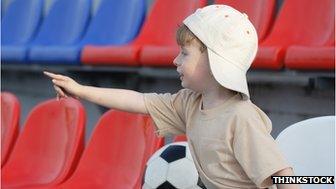The changing face of football crowds
- Published

An increasing number of families are boosting numbers in stadiums with clubs working to attract and retain new fans
The start of the football season this weekend has arrived with a little less fanfare than usual as the euphoria of the Olympics dies down.
But while the return of the domestic leagues may have crept up on us, it feels safe to assume the ups and downs of England's national sport will soon be dominating the headlines again.
Football's popularity has not been tempered by the economic gloom, with attendances in the Football League increasing again last season.
Sports sociologist John Williams from Leicester University says the game has seemed "almost recession proof".
An increasing number of families are boosting numbers in stadiums with clubs working on new innovations to attract and retain new fans while competing among themselves for recognition in the Football League's Family Excellence Awards.
Changed mindset
The awards are run by the Fan Experience Company, a family business led by avid Sunderland supporter Mark Bradley, originally from Stanley, County Durham.
The firm has an army of families ready to visit football clubs for the first time and score them on every aspect of their experience.
Mr Bradley has witnessed clubs like Middlesbrough overhaul their concourse food offering to include local delicacies like the parmo burger, while staff at Cardiff City and Brighton have concentrated on making sure away fans come back year after year.
Away from individual gimmicks, Mr Bradley said feedback from new customers was helping to change the mindset of football clubs.
"If you confront organisations with the real experiences of customers that often works as the catalyst for change," he said.
"The principle is that each club receives two visits from families that are new to the live football experience. It's not about mystery shopping, this is done with real people.
"The clubs get unedited feedback from the families on everything from their website, the ticket office, the game itself and the car park. It's qualitative data."
Adopting a more traditional business-minded approach to its customers has been rewarding for the clubs.
'Pretty rudimentary'
The Football League said attendance by families had grown by 12% after three years of the awards, adding approximately two million people to the aggregate attendance. Mr Bradley says this is an "astonishing" figure.
Mr Williams, who researches the culture of football, said developments in stadiums and policing meant today's crowd was "very different" to that of the 1980s.
He said: "I think we often forget how difficult the experience had been in the 1980s. Prior to the Hillsborough stadium disaster, football grounds were very difficult places and the game had a very negative national image.
"Hooliganism had become part of the fabric of the game and facilities at many grounds were pretty rudimentary. The game was in a rut."
Mr Williams believes the presentation and packaging of football on television on Sky made it desirable to a wider and more family-orientated audience.
He said: "It was really satellite television that got the message across. It began to present Premier League football as something different, as something rather exclusive and as an attractive lifestyle accessory.
"It began to make the game appeal to what you might crudely say was a more middle class audience."
'Alienating'
Mr Williams accepts that a certain demographic has been largely excluded by the game's evolution and price increases.
He said: "If you're in low pay or particularly if you're unemployed, or if you're in that group of young teenage men from lower class backgrounds who don't particularly want to attend with parents and want freedom to see football as part of a youth culture, for those groups what has happened has been particularly alienating."
Between 50 and 70 families will assess their "matchday experience" this coming season and Mr Bradley insists that while price is a factor, once fans are hooked they tend to pay less attention to the costs of supporting a team.
"Price is important when it comes to getting fans to their first game but it's a less influential factor when it comes to getting them back," he said.
"I think it's fair to say that when you look at the core football fan what we've learned is that it's going to be one of the last things to go when money gets tight."
Many clubs, Mr Bradley says, believe "intrinsically" that only success on the pitch can help them grow.
This is not always the case though, he says, as he quotes an example from the winners of last season's Family Club of the Year Award.
"Portsmouth randomly chooses a family and sit them in the dugout 30 minutes before the game," he said.
"It doesn't upset the groundsman, the manager doesn't need the dugout, they get to see the players come and go right at the heart of the action - that has got them hooked, they're not going to support another club.
"Some clubs can take the magic in their hands for granted."